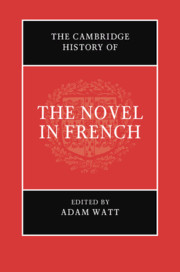Book contents
- The Cambridge History of the Novel in French
- The Cambridge History of the Novel in French
- Copyright page
- Contents
- Figures
- Contributors
- Acknowledgements
- Note on Conventions
- Chronology
- Introduction
- Part I Beginnings: From the Late Medieval to Madame de Lafayette
- Part II The Eighteenth Century: Learning, Letters, Libertinage
- Part III After the Revolution: The Novel in the Long Nineteenth Century
- Part IV From Naturalism to the Nouveau Roman
- 22 The Republic of Novels: Politics and Late Nineteenth-Century French Fiction
- 23 Medicine, Sex and the Novel: Maupassant and Rachilde
- 24 The Roman-Fleuve
- 25 Marcel Proust’s À la recherche du temps perdu
- 26 The Novel in France Between the Wars
- 27 Existentialism and the Novel
- 28 Suspicion and Novelty: The Nouveau Roman
- 29 The Holocaust and the Novel in French
- Part V Fictions of the Fifth Republic: From de Gaulle to the Internet Age
- Index
- References
24 - The Roman-Fleuve
from Part IV - From Naturalism to the Nouveau Roman
Published online by Cambridge University Press: 04 February 2021
- The Cambridge History of the Novel in French
- The Cambridge History of the Novel in French
- Copyright page
- Contents
- Figures
- Contributors
- Acknowledgements
- Note on Conventions
- Chronology
- Introduction
- Part I Beginnings: From the Late Medieval to Madame de Lafayette
- Part II The Eighteenth Century: Learning, Letters, Libertinage
- Part III After the Revolution: The Novel in the Long Nineteenth Century
- Part IV From Naturalism to the Nouveau Roman
- 22 The Republic of Novels: Politics and Late Nineteenth-Century French Fiction
- 23 Medicine, Sex and the Novel: Maupassant and Rachilde
- 24 The Roman-Fleuve
- 25 Marcel Proust’s À la recherche du temps perdu
- 26 The Novel in France Between the Wars
- 27 Existentialism and the Novel
- 28 Suspicion and Novelty: The Nouveau Roman
- 29 The Holocaust and the Novel in French
- Part V Fictions of the Fifth Republic: From de Gaulle to the Internet Age
- Index
- References
Summary
This chapter explores the early twentieth-century phenomenon known as the roman-fleuve (river-novel) and proposes a model for understanding its place within French literary history. The origins of the term can be traced back to Romain Rolland’s Jean-Christophe, a multi-volume novel recounting the fictional life story of its eponymous protagonist. Although there are notable stylistic and thematic differences between it and the novel cycles of the other three proponents of the roman-fleuve form—Roger Martin du Gard, Jules Romains, and Georges Duhamel—Jean-Christophe provides the yardstick against which these later literary creations must be measured. Utilizing Rolland’s protagonist as its central reference point, the chapter contends that the roman-fleuve’s overarching ambition is to rework the notion of the modern subject in function of an alternative understanding of the individual and the collective. In a tumultuous era marked by war and the crumbling of religious and metaphysical certainties, this reconception of subjectivity inaugurated an innovative literary exploration of Bergsonian intuition and the Nietzschean overturning of ready-made systems of thought. Lying between the sentimentality of the romantics and the materialism of the positivists, the roman-fleuve was a landmark, if short-lived, example of French literary creativity blossoming in the arid ground of modernity.
- Type
- Chapter
- Information
- The Cambridge History of the Novel in French , pp. 439 - 455Publisher: Cambridge University PressPrint publication year: 2021

